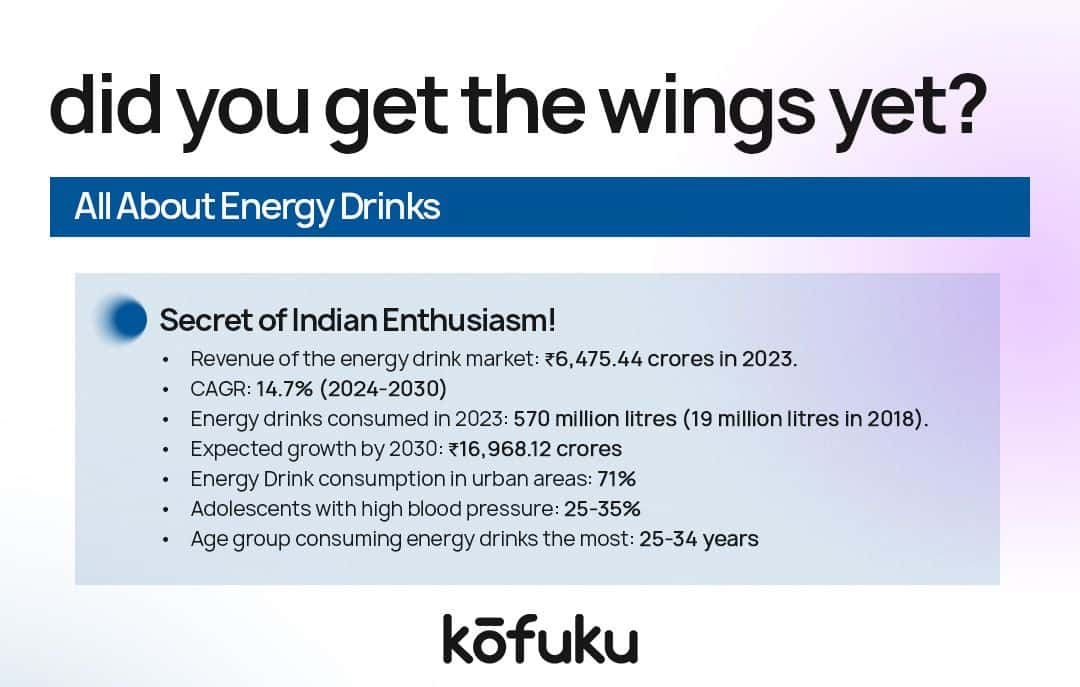Energy Drinks: Boost or Bust? The Good, Bad, and Ugly

Introduction
What do offices, turfs, and a bachelor’s flat have in common? They all have a bunch of energy drinks lying around! Red Bull, Monster, Sting, Gatorade, and Prime are all names that have come into regular vocabulary.
They promise quite a lot, like more energy and the ability to stay awake, all the way to getting girls and from students pulling an all-nighter to athletes seeking an edge, these drinks are consumed by millions worldwide.
However, beneath all the promises, energy drinks' health risks get swept under the rug. And that’s what we’re here to sweep back up! So, sit back, grab a glass of water and understand why you should cut back on your energy drink intake!
The Good: Benefits of Energy Drinks
Staying Mentally Alert
One of the main reasons people drink energy drinks is to stay up all night getting work done. Students drink energy drinks to stay up preparing for their finals and once they graduate, they drink energy drinks to finish their projects and assignments overnight.
The caffeine content in these beverages acts as a central nervous system stimulant, which improves concentration, reaction times, and alertness. Studies have shown that consuming energy drinks can reduce mental fatigue and improve measures of brain function, such as memory and concentration.
Improved Physical Performance
Many athletes sip on energy drinks during training games. We’ve seen tennis players take a quick sip in between games or footballers squirt some of it into their mouths, proudly displaying their sponsor.
The caffeine in these drinks is positively correlated with enhanced endurance, increased strength, and reduced perceived strain during exercise. Research has also shown that caffeine can improve various aspects of physical performance, making energy drinks a popular choice among those engaged in prolonged or high-intensity activities.
Convenience and Quick Energy Boost
It’s common to indulge in energy drinks when you're low on energy and need a boost to reach a diamond on Valorant. Gaming takes up a lot of energy, and energy drinks are a great supplement. Mainly because they’re packaged in tiny bottles and cans, it’s easy to buy, drink from and move around. Perfect for busy people on the go.

The Bad: Side Effects of Energy Drinks
Cardiovascular Concerns
Sure, energy drinks can provide a quick boost, but it comes with a lot of risks, mainly concerning the health of your heart. The high caffeine content can lead to increased heart rate and blood pressure.
Some studies have linked energy drink consumption to heart problems, such as irregular heartbeats and cardiac arrest, especially in people with pre-existing health conditions.
Sleep Disruptions
This is a no-brainer. When you spike your body with caffeine, it’s going to be more challenging to fall asleep and go into the REM cycle. Having energy drinks, especially in the second half of the day, can lead to difficulties falling asleep, reduced sleep quality, and insomnia.
Having a really bad sleep cycle can cascade into poor health, including impaired cognitive function and increased susceptibility to general illnesses.
Anxiety and Mood Alterations
Research has shown that too much caffeine can worsen anxiety, which can make someone more nervous and restless, and even get panic attacks if it gets too severe. The combination of caffeine and other stimulants can contribute to mood swings and irritability.
Gastrointestinal Issues
Energy drinks often contain high levels of sugar and acidic components, which can cause gastrointestinal discomfort. Many people have experienced stomach aches, nausea, and acid reflux, particularly when these beverages are consumed on an empty stomach or in large quantities.
The Ugly: Severe Health Risks
Risk of Cardiac Events
There have been reports of severe cardiac events associated with energy drink consumption. For instance, a 20-year-old woman in the US suffered multiple cardiac arrests after having an energy drink during a workout.
This might be an outlier, but it still brings about the potential dangers, especially when energy drinks are consumed during extreme workouts or by people suffering from some health condition.
Potential for Addiction
Energy drinks, like coffee, can lead to dependence due to their caffeine content. Many people develop a tolerance for it, so they end up drinking more to get the same buzz, which only leads to a cycle of dependence and drinking more and more. Withdrawal symptoms can include headaches, fatigue, and irritability.
Dehydration Risks
Caffeine has diuretic properties, which can increase urine production and potentially lead to dehydration, especially when energy drinks are consumed during physical activity without proper water intake. Dehydration can worsen athletic performance and increase the risk of heat-related illnesses.

Energy Drink Consumption Guidelines
To reduce the potential health risks associated with energy drinks, you can try out the following guidelines:
-
Moderation is Key: Limit consumption to one can per day and avoid daily use to prevent dependence and reduce health risks.
-
Read Labels Carefully: Be aware of the caffeine and sugar content in your chosen energy drink. Opt for versions with lower caffeine levels and minimal added sugars.
-
Avoid Mixing with Alcohol: Combining energy drinks with alcohol can mask the depressant effects of alcohol, leading to increased consumption and a higher risk of alcohol-related harm.
-
Stay Hydrated: Ensure adequate water intake, especially during and after physical activity, to counteract the diuretic effects of caffeine.
-
Consult Healthcare Providers: Individuals with underlying health conditions, particularly cardiovascular issues, should consult healthcare professionals before consuming energy drinks.
Healthier Alternatives to Energy Drinks
If you’re on the lookout for energy boosts without the associated risks of energy drinks, consider the following alternatives:
-
Green Tea: Offers a moderate caffeine boost along with antioxidants that promote overall health.
-
Coconut Water: A light and great source of energy that’s cheap and available everywhere.
-
Smoothies: Combining fruits, vegetables, and proteins can provide sustained energy and essential nutrients.
-
Adequate Sleep: Prioritising quality sleep is fundamental to maintaining natural energy levels and overall well-being.
-
Regular Physical Activity: Regular exercise can enhance energy levels and improve mood by releasing endorphins.
Conclusion
Now you know that although energy drinks can be good for you now and then, drinking them daily can be pretty bad, not only for your heart and physical health but your mental health, too. Being dependent on it is why many people struggle to get away from it as they continue to consume more and more of it.
But by being aware of the health risks of energy drinks and actively working towards reducing your intake of them, you can create your energy and get rid of energy drinks altogether!


30 Effective Kettlebell Exercises for Every Workout

Why Your Headaches Might Be Hiding a Bigger Issue

Healthy Family Nutrition Tips for Strength and Togetherness


